Alhambra: Tickets and Tours
The Alhambra is one of Spain's most stunning architectural marvels, an emblem of historical grandeur nestled in the heart of Andalusia. This breathtaking palace and fortress complex, dating back to the 13th and 14th centuries, stands as a testament to the area's opulent past.
Perched in the city of Granada, the Alhambra's name is derived from the Arabic "Al-Ḥamrā," meaning "the red one"—a tribute to the distinctive reddish hue of its walls and a reminder of the Islamic influence that prevailed in Spain for almost eight centuries.
Designated as a UNESCO World Heritage Site, the Alhambra has been a muse for various literary and musical compositions. Securing Alhambra tickets is essential for any visitor to Granada, ensuring an unforgettable experience at what is undoubtedly the city's crowning attraction.
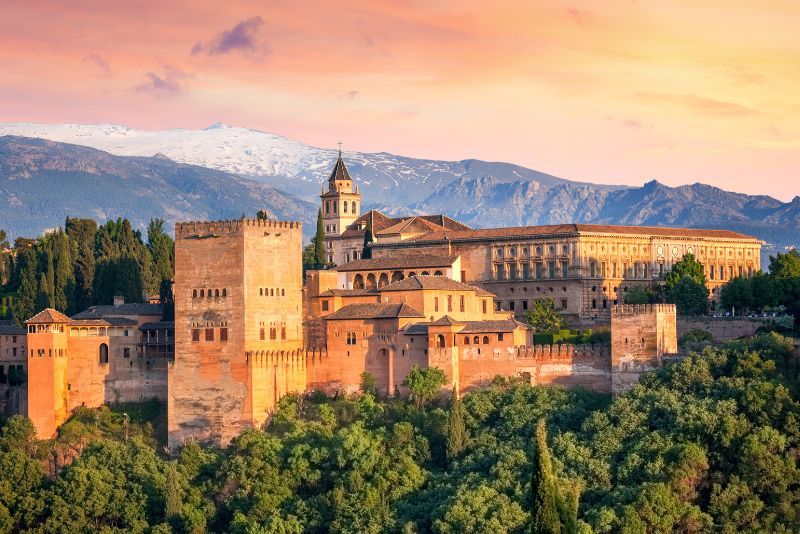
Here’s all you need to know about Alhambra, one of the most exciting attractions in Granada.
How much do Alhambra tickets cost?
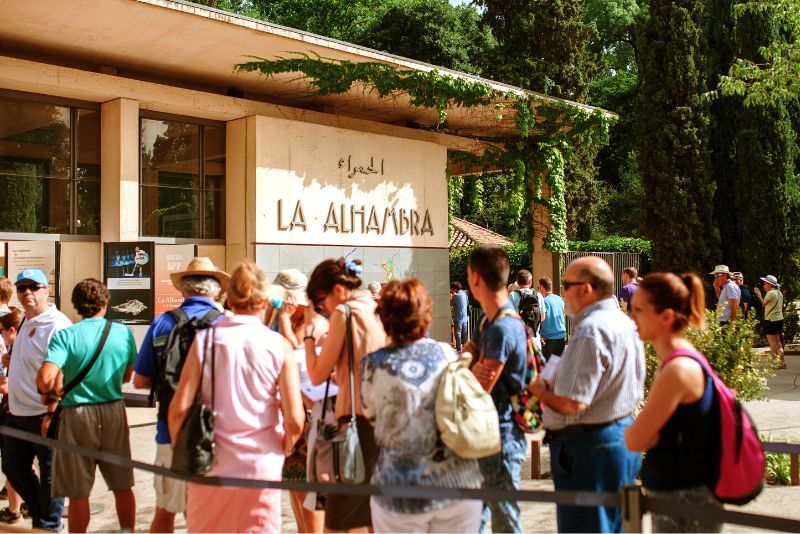
There are several types of Alhambra tickets, each of which offers access to different sections of the complex.
General Admission Alhambra tickets
These Alhambra tickets provide access to Alcazaba, Nasrid Palaces, Generalife and Partal.
- Adults: €19.09
- EU Youth Card holders: €12.73
- EU senior citizens (65+): €12.73
- Visitors with disabilities of 33% or more: €12.73
- Children (12-15): €12.73
- Members of large families: €12.73
- Children (3-11): Free
Night Visit to Nasrid Palaces
These night visit tickets to Nasrid Palaces provide access to the Mexuar, Comares Palaces, Palace of the Lions and Corridor Lindaraja.
- Adults: €10.61
- EU Youth Card holders: €7.42
- EU senior citizens (65+): €7.42
- Visitors with disabilities of 33% or more: €7.42
- Children (12-15): €7.42
- Members of large families: €7.42
- Children (3-11): Free
Night Visit to Gardens and Generalife
These night visit tickets provide access to the pavilion, a walk of the walnut trees, the gardens of Generalife and the Generalife Palace.
- Adults: €7.42
- EU Youth Card holders: €5.30
- EU senior citizens (65+): €5.30
- Visitors with disabilities of 33% or more: €5.30
- Children (12-15): €5.30
- Members of large families: €5.30
- Children (3-11): Free
Gardens, Generalife and Alcazaba
These tickets allow access to the promenade of the Cypress, Dryland and San Francisco Gardens, Alcazaba, Partal and the Generalife Palace and Gardens.
- Adults: €10.61
- EU Youth Card holders: €7.42
- EU senior citizens (65+): €7.42
- Visitors with disabilities of 33% or more: €7.42
- Children (12-15): €7.42
- Members of large families: €7.42
- Children (3-11): Free
Alhambra Experiences
The Alhambra Experiences include a night visit to the Nasrid Palaces and a day visit to Partal, Alcazaba and gardens and the palace of Generalife the following day.
- Adults: €19.09
- EU Youth Card holders: €12.73
- EU senior citizens (65+): €12.73
- Children (12-15): €12.73
- Members of large families: €12.73
- People with disabilities equal to or over 33%: €12.73
- Children (3-11): Free
General Gold Double
The General Gold Double tickets include daytime visits to Nasrid Palaces, Alcazaba, gardens and Generalife Palace on the day indicated on the ticket, and a daytime visit to the Andalusian Monuments.
- Adults: €27.30
- Children (3-11): Free
Doubla de Oro Nocturnal
The Doubla de Oro Nocturnal (Nocturnal Gold Double) tickets include a night visit to the Nasrid Palaces and a daytime visit to the Andalusian Monuments.
- Adults: €20.93
- Children (3-11): Free
Andalusian Monuments
These tickets allow access to the Andalusian Monuments only.
- Adults: €7.42
- Children (3-11): Free
Who is eligible for discounts?
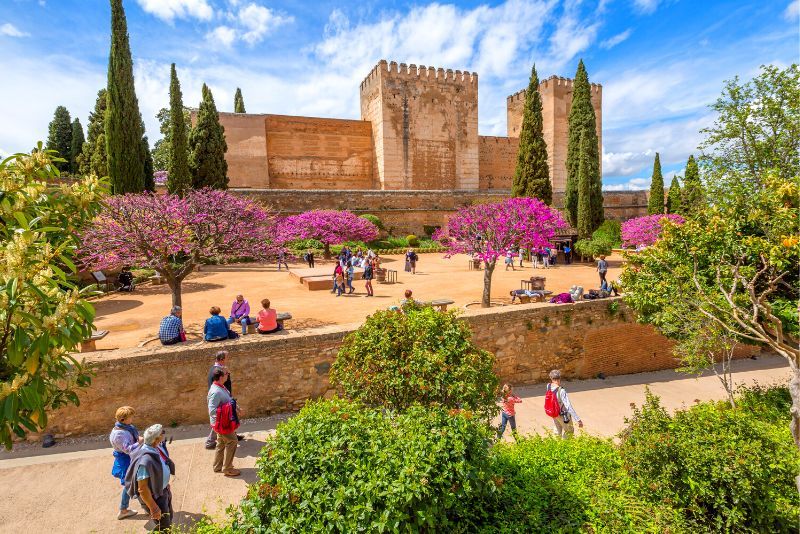
Alhambra offers discounted ticket rates for children aged 12 to 15, EU citizens with a European Youth Card, senior EU citizens over 65, large families and visitors with disabilities. It is important to note that visitors eligible for discounted tickets must bring along any relevant documentation to prove that they qualify for the lower rate.
Should you book in advance?
The Alhambra is one of the most popular attractions in Spain and only a limited number of tickets are available daily. As such, it’s not uncommon for Alhambra tickets to sell out, especially during the peak tourist season. To avoid that, it is strongly advised to book online several weeks to secure your spot.
As a preserved site, there is a cap on the number of people who can visit Alhambra each day. By booking your Alhambra tickets in advance, you can also choose the time slot that suits you the best for the Nasrid Palaces.
What are the best Alhambra tours?
There are many different ways of visiting Alhambra, from self-guided audio tours, to guided night tours and private excursions. Below is a breakdown of the different types of tours that are available.
Self-guided Alhambra tours

If you like to explore at your own pace and on your own terms, you can opt for a self-guided tour of Alhambra. Choose your desired route and the audio guide will inform you of the many fascinating aspects of this World Heritage Site, from its history to its architecture.
Self-guided Alhambra tours typically last 2.5 to 3 hours and include skip-the-line access. Audio guides also come several languages, making information accessible to numerous people. Audio guides will also offer offline content, so there is no need to worry about charges!
Guided tours of Alhambra
Join a guided tour of Alhambra and enjoy the beautiful sights with the help of an expert who will explain the history of Alhambra and its monuments. Alhambra has a centuries-long history, and many of the famed palaces you will see today were built by the Moors in the 13th and 14th centuries.
These guided tours of Alhambra typically visit the Nasrid Palaces, the gardens and the palace of Generalife and Alcazaba, however the itinerary and inclusion of tickets may vary between operators. Group tours typically take about 3 hours, ensuring sufficient time to explore and become acquainted with the phenomenal grounds.
Guided night tours of Alhambra
For a more quiet and relaxed tour consider booking a guided night tour of Alhambra. These truly unique experiences allow you to discover this magical place under the starlit sky with the company of an experience, who will lead you through the Nasrid Palaces to the Court of the Lions.
On some night tours, you may even be able to complement the experience with a flamenco show, and be enthralled by the performance of a dance and musical form that originated in Andalusia.
Private guided tours of Alhambra
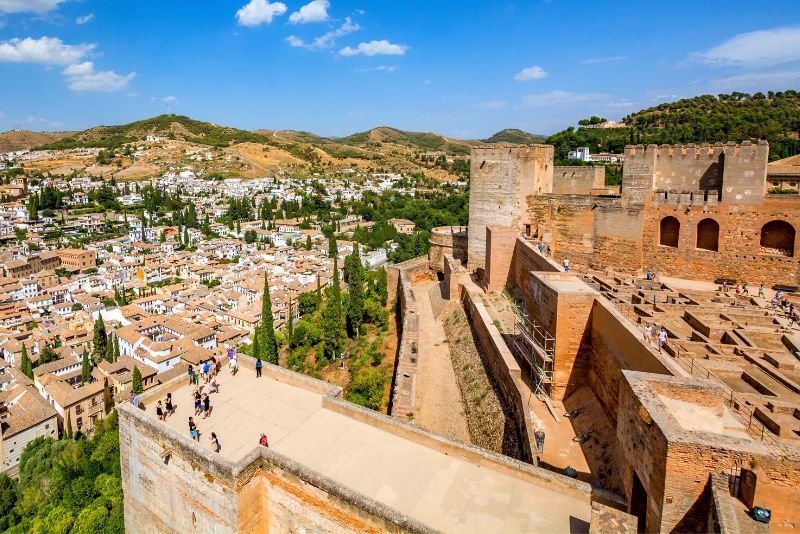
For a more intimate visit that is tailored to your needs and interests, a private tour of Alhambra is an ideal option. Catering exclusively to your group, these private excursions allow the greatest degree flexibility and include the services of an experienced guide to walk you through the complex.
The itinerary of private guided tours of the Alhambra can be adjusted and may also include a tour of the Dobla de Oro or further sightseeing in Granada for a more comprehensive experience.
Are there any combined tickets or tours including Alhambra and other attractions?
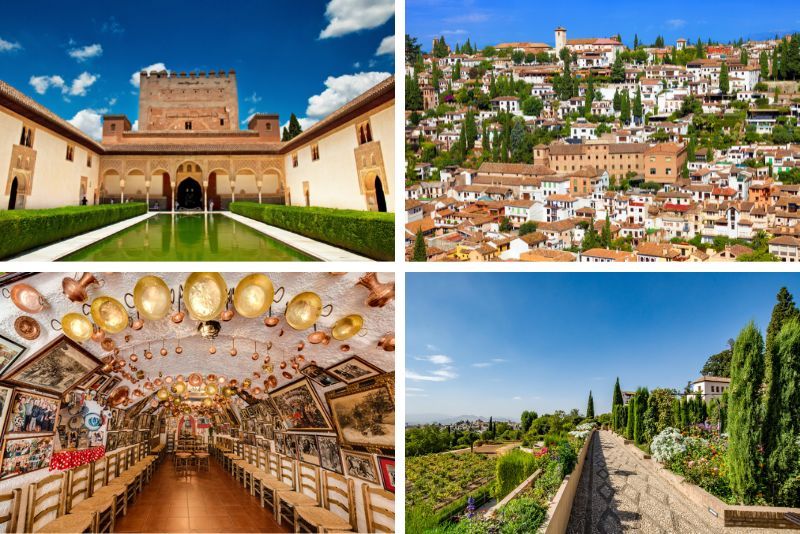
Yes, if you are looking to make the most of your stay in Granada and extend your visit of Alhambra, there are combined tickets and tours available.
- Alhambra plus Sacromonte and flamenco show combo: Combine your tour of Alhambra with a visit to Sacromonte, where you’ll see traditional cave houses and can also watch a flamenco show.
- Alhambra plus Albaicín combo tour: Gain an appreciation for Granada with a combo tour to Alhambra and Albaicín. As the oldest quarter of Granada, Albaicín has a Moorish medieval history and beautiful monuments.
- Alhambra plus Hammam combo tour: Start your day with a guided visit to Alhambra and follow it up with a trip to the Arab baths of Hammam Al Ándalu, where you can relax with a soothing massage in Granada.
What will you see inside?
The Alhambra monument complex consists of four main areas: Alcazaba, Nasrid Palaces, Partal and Generalife. While there, you can also visit the Andalusian Monuments, which are situated in Albaicín.
Alcazaba
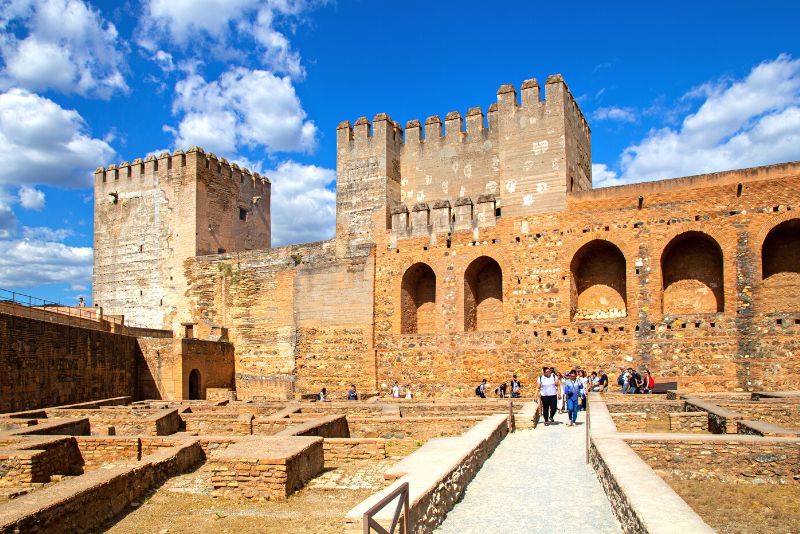
Alcazaba is one of the oldest sections of Alhambra, originally designed as a military complex to protect the Muslim emirate from invaders. Strategically situated on a hill that is fairly difficult to access, the fortress is surrounded by forests and mountains.
Once the home of soldiers patrolling and guarding the palatial city, the Alcazaba still stands today and impresses with its expansive layout and towers. Al-Ahmar, the founder of the Nasrid dynasty, moved into Alcazaba in the 13th century, and from here, began constructing the magnificent Alhambra complex.
Nasrid Palaces
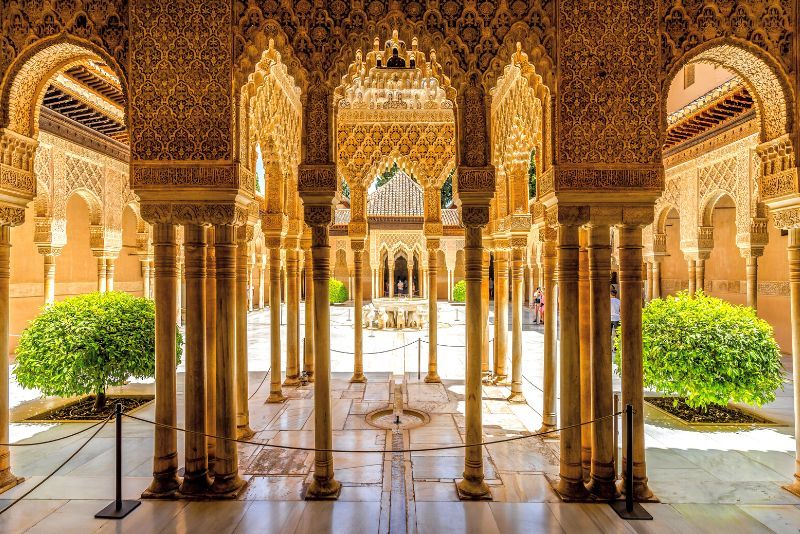
The Nasrid Palaces were built between the 13th and 14th centuries and were the administrative and residential buildings for the Nasrid dynasty. The impressive structures and are some of the most prominent and well-preserved buildings of the Alhambra complex.
On a visit to the Nasrid Palaces, you can explore the Mexuar, where ministers once convened meet. Nearby is the Golden Room and the Comares Palaces with an intricately detailed façade and striking tower overlooking a glistening pool.
One of the most renowned sections of Alhambra is the Palace of the Lions, home to the Court of the Lions. This architecturally impressive courtyard features an iconic fountain supported by 12 lion sculptures. The Palace of the Lions also houses stunning muqarnas, which are intricate vaultings in Islamic architecture that resemble ornamental stalactites.
Scattered throughout the palace are also five preserved poems, offering just a glimpse into the rich tapestry of poetry inscribed throughout the Alhambra's walls. Finally, don’t miss the Lindaraja corridor in the Nasrid Palaces is, which overlooks the immaculate Alhambra gardens.
Partal
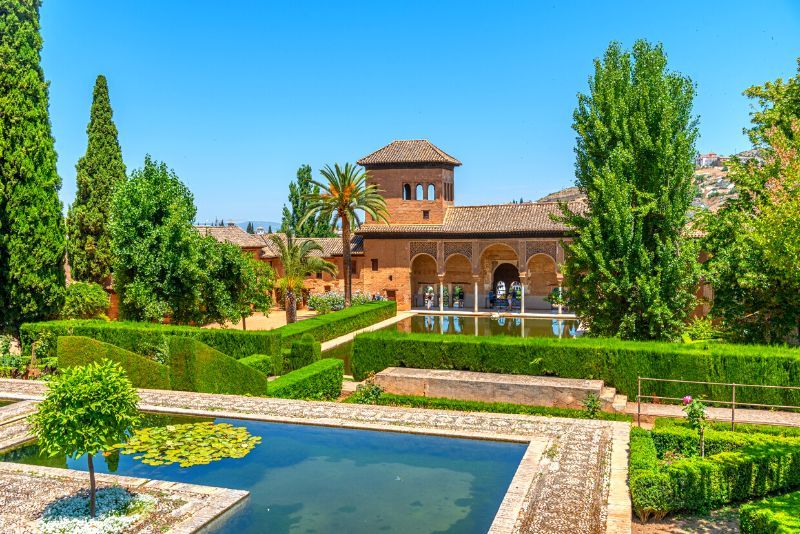
The Partal stands as another enchanting segment of the Alhambra, characterized by its elegant portico that gazes upon a serene body of water. This area, surrounded by lush, decorated gardens, is home to the Partal Palace, the most ancient palace within the complex.
While visiting, take a moment to appreciate the artistry of its wooden ceilings as you make your way to the oratory. This space was intentionally designed to provide the sultan with a contemplative area for reflection and prayer, set against the backdrop of the stunning Andalusian scenery.
Generalife
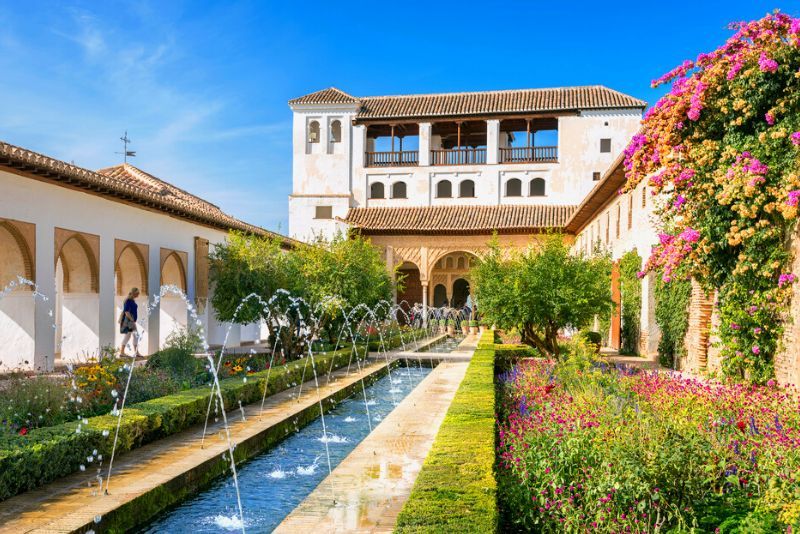
The Generalife, with its gardens and palace, ranks among the most captivating attractions of the Alhambra. Originally conceived as the sultan's summer retreat, the Generalife is nestled amidst lush orchards and green pastures, providing a tranquil escape.
Wandering through the gardens, you can admire and explore the Patio del Ciprés de la Sultana, renowned for its majestic cypress trees, as well as the Patio de la Acequia, famed for its central water channel and fountain that have inspired similar designs across the globe.
The gardens of Generalife are brimming with intriguing elements, such as a stairway with water channels—aptly named the 'water stairway'—a pathway lined with cypresses, a charming gazebo, and demonstrations of the sophisticated and advanced water system. This system ingeniously delivered water from the nearby river to the gardens and the wider Alhambra estate.
Palace of Charles V
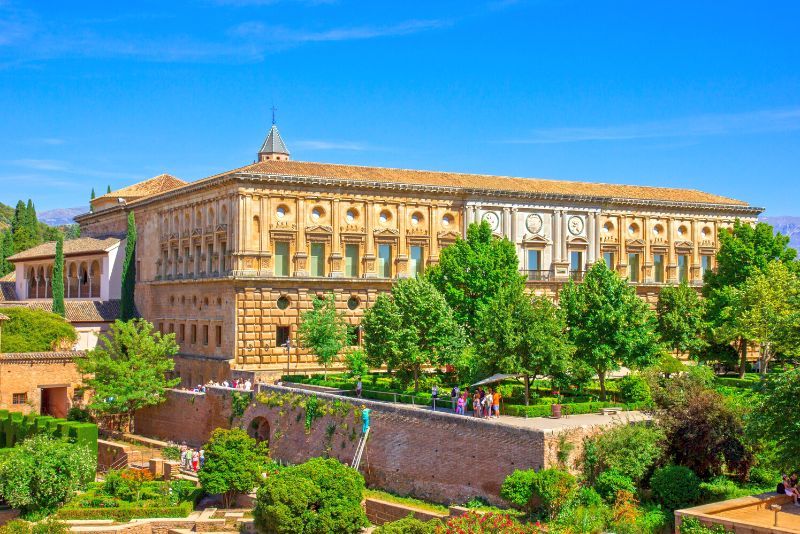
While the Nasrid dynasty is credited with much of the Alhambra's design, they were also its final Muslim rulers in Spain until their reign ended in 1492. The Alhambra then transformed into a stronghold and a symbol of the last stand against the Reconquista, the Christian reclamation that marked the end of the Al-Andalus period.
Following this epochal shift, the Alhambra became the Royal Court of the Catholic Monarchs, Ferdinand and Isabella. It was here that Christopher Columbus received the royal blessings for his voyage to the New World.
Their heir, Charles V, introduced a distinct architectural statement by constructing the palace that bears his name, right in the heart of the Alhambra. This palace, which opened its doors in 1526, stands as a significant example of Renaissance architecture within the complex, representing the layers of history and cultural influences that have shaped the Alhambra.
Visitors can explore the Palace of Charles V and the Alhambra Museum within it for free. The museum showcases a collection of Islamic art and artifacts unearthed from the Alhambra site. Within the palace, you will also find the Museo de Bellas Artes de Granada, which features works by renowned local artists that highlight Granada itself.
Andalusian Monuments
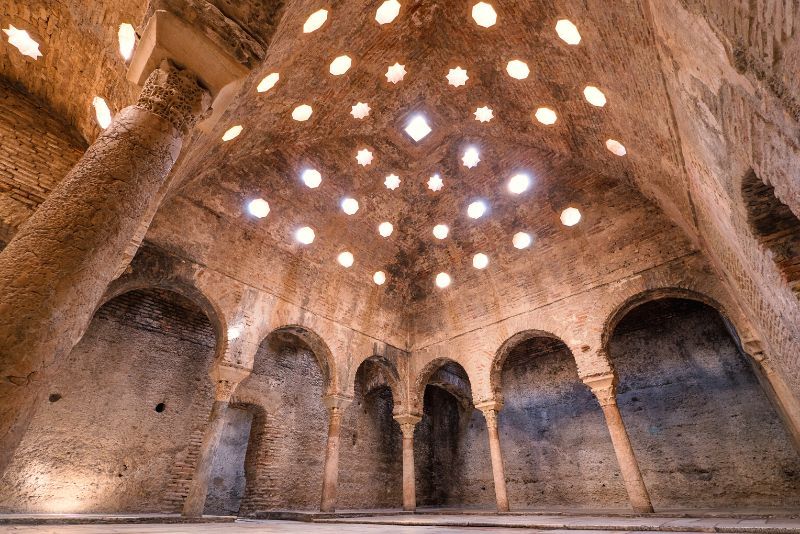
The splendor of the Alhambra is just one facet of Granada's rich history, which is further echoed in the Andalusian Monuments located in the city's oldest quarter, Albaicín.
Known collectively as the Dobla de Oro, these monuments showcase some of the finest examples of Muslim architecture, such as the Baño del Nogal, an authentic Arab bath that traces its origins back to the 12th century. Nearby you will also find the Corral del Carbón, once a bustling marketplace where traders stored and sold wheat.
Additionally, there are two palaces of note: the Casa del Chapiz (Golden Furnace House) and the Dar al-Horra Palace, both of which exemplify the early Islamic architectural style that characterizes this historical area.
How to get there?

Alhambra is centrally located within Granada on Calle Real de la Alhambra, and is easily reachable from the city center. If you are the athletic type (remember Alhambra is on a hill), you can get there on foot in 15 to 30 minutes
There are several routes with different starting points, including one at Cuesta de Goménez, roughly 1 kilometer away from the Alhambra, one at Cuesta del Rey Chico, roughly 850 meters away, and another at Cuesta del Realejo, about 2 kilometers away.
You can also take the bus to Alhambra. Several lines have stops at Alhambra, including the C30 (Alhambra – Centro), the C32 (Alhambra – Albaicin) and the C35 (Cementerio-Barranco del Abogado-Centro). You must get off at Alhexplorationeralife 2.
If you wish to go by car, you can easily follow the street signs to Alhambra, ending up on Avda. De Santa María de la Alhambra and the Old Cemetery road. There is a car park nearby available with 360 available parking spaces.
What are the opening times?
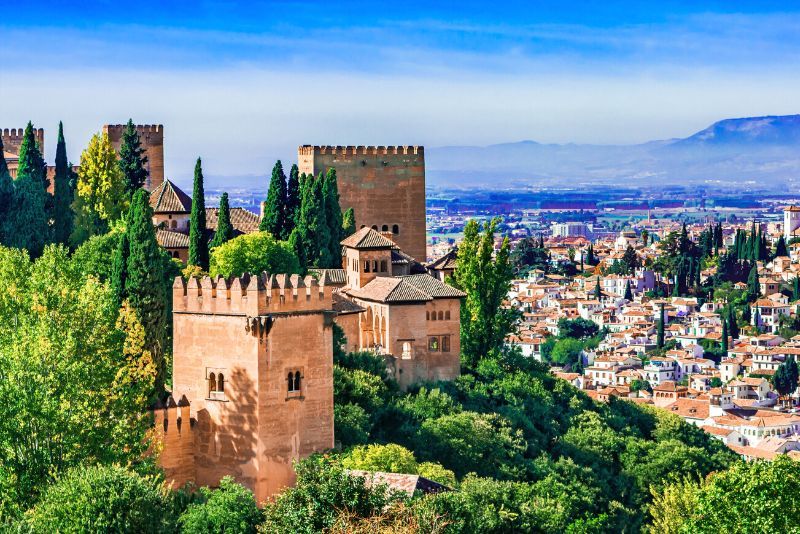
The Alhambra monumental complex is open every day of the week except on Dec. 25 and Jan. 1. The seasonal operating hours change in the summer (April 1 to Oct. 14) and winter (Oct. 15 to March 31). Aside from day time visits, there are also night time visits on certain days.
Summer opening hours
- Day (Monday to Sunday): 8:30 AM to 8 PM
- Night (Tuesday to Saturday): 10 PM to 11:30 PM
Winter opening hours
- Day (Monday to Sunday): 8:30 AM to 6 PM
- Night (Friday to Saturday): 8 PM to 9:30 PM
Is it wheelchair friendly?
Yes, the Alhambra is wheelchair-friendly and has established a route for visitors with limited mobility to tour the complex. Keep in mind though that due to narrow corridors, steps and uneven surfaces, some sections might be a bit challenging or not accessible. Additionally, wheelchairs are available for hire at the entrance of the Alhambra.
When is the best time to visit Alhambra?
The best time to visit the Alhambra in Granada is either in the spring (March to June) or fall (September to November). These seasons offer mild weather, fewer crowds, and the gardens are in full bloom or with autumn colors.
You may want to avoid vusiting in the summer due to extreme heat and winter for occasional rain. Booking tickets in advance is essential as they sell out quickly, especially during peak visiting hours (10 AM to 2 PM).
Which other attractions can be visited in Granada?
Travel tips
- Only a limited number of people can visit the Alhambra each day. Book your tickets well in advance, as they can sell out quickly, especially during peak tourist season.
- There's a lot of walking on uneven surfaces, so wear comfortable footwear.
- Carry water, especially during warmer months, as exploring the complex can take several hours.
- Charge your camera or phone, as the Alhambra offers stunning photo opportunities, but note that tripods are not allowed without a permit.
- The Alhambra is a UNESCO World Heritage Site. Don’t touch or damage the delicate stonework and maintain decorum.